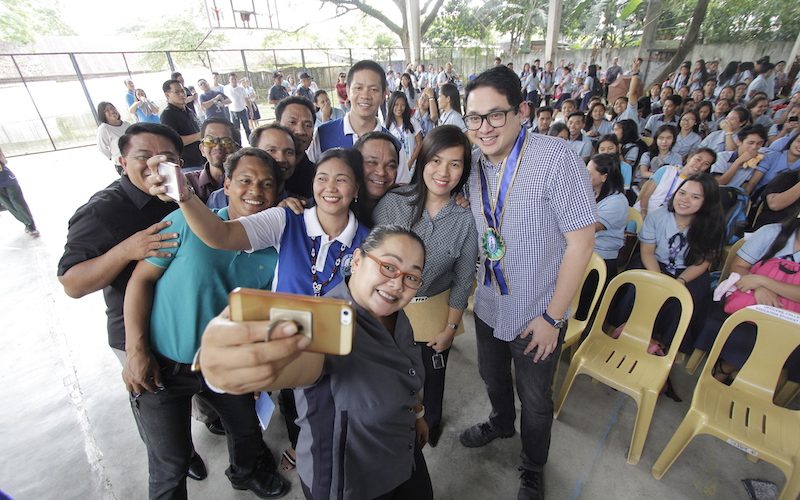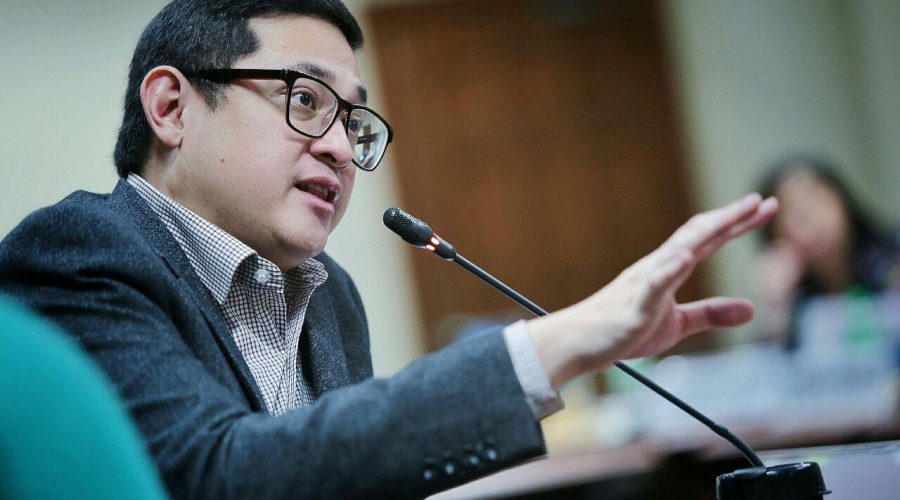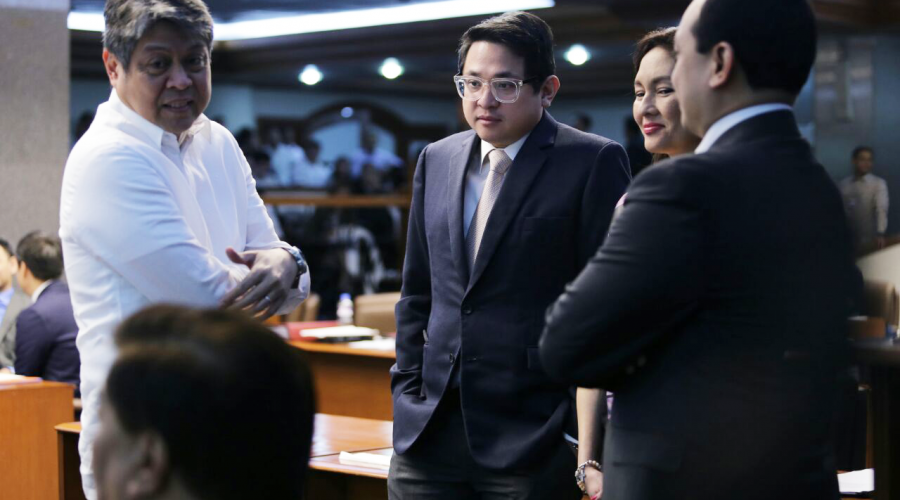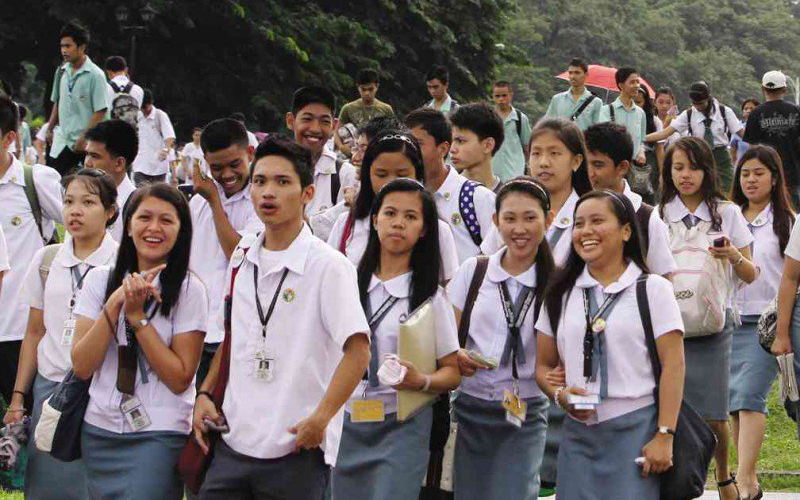education
Sen. Bam: Don’t forget public schools in free WIFI rollout
Don’t forget our public schools and state universities and colleges (SUCs).
Senator Bam Aquino issued this call as the government prepares the rollout of Republic Act 10929 or the Free Internet Access Program in Public Places, which he pushed in the Senate as principal sponsor and co-author, saying Filipino students will benefit from free internet as a vital tool to further enrich their knowledge.
“Internet is an important tool in learning. Students are empowered by the internet in learning lessons, completing assignments, and research,” said Sen. Bam, principal sponsor and co-author of the measure in the Senate in his capacity as chairman of the Committee on Science and Technology.
“Magagamit din ito ng ating mga guro para mapabuti ang kanilang mga sistema ng pagtuturo,” added Sen. Bam.
Republic Act 10929 provides free internet access in all national and local government offices, public schools, public transport terminals, public hospitals and public libraries.
“This will expand internet access across public spaces in the Philippines, including public schools to aid in teaching methods and enhance learning,” the senator said.
In addition, the law contains provisions for the faster processing of permits for internet infrastructure, which is designed to fast-track the improvement in the country’s internet backbone.
As part of its mandate under the law, the Department of Information and Communications Technology (DICT) is tasked to craft a plan and a timeline for the rollout of the program.
In its latest report, the DICT said it’s planning to establish 250,000 Wi-Fi access points in public places throughout the country until 2022.
During this stint as chairman of the Committee on Trade, Commerce and Entrepreneurship in the 16th Congress, Sen. Bam spearheaded an investigation into the slow and expensive internet in the country.
The probe helped determine needed legislations to address the internet problem in the country and led to the release of a Department of Justice opinion on telco advertising.
The hearing also compelled the National Telecommunications Commission (NTC) to come out with guidelines on minimum internet speeds and conducted speed testing in various areas of the Philippines to check compliance of telcos.
As the current chairman of the Committee on Science and Technology, Sen. Bam is principal sponsor of the free internet reform. He also filed Senate Bill No. 171 or the Open Access in Data Transmission Act of 2016, which has yet to be passed into law to enable more players into and promote competition in the internet industry.
Principal sponsors have the responsibility of prioritizing bills in their respective committees, conducting hearings on bills assigned to their committee, defending the measures during the period of interpellation, consolidating proposals and amendments to their reforms, and leading the bicameral conference before a bill is passed into law.
—
Sen. Bam disappointed free college bill not mentioned in SONA
“Nasaan ang libreng kolehiyo?”
Sen. Bam Aquino raised this question as he expressed disappointment over President Duterte’s failure to mention free college education in his State of the Nation Address (SONA).
“Marami pong umasa na babanggitin ni Pangulong Duterte ang napakaimportanteng repormang ito na magbibigay ng libreng edukasyon sa milyon-milyong Pilipino, lalo pa’t pirma na lang niya ang kulang upang ito’y maisabatas. Nakakapanghinayang na hindi ito binanggit,” said Sen. Bam.
Sen. Bam is still hopeful though that the president will decide to sign this bill into law.
He also mentioned he was happy with some pronouncements during the SONA, including enhancing support for the Armed Forces, improving government efficiency, providing free internet in public spaces which he also sponsored, and some legislative measures like the Land Use Act, BBL, as well as changes in mining policies.
But the senator stressed the need to prioritize free education and give more Filipinos access to a college degree and a brighter future.
“Isabatas na sana ang panukalang ito sa lalong madaling panahon,” said Sen. Bam.
Sen. Bam is the principal sponsor and co-author of two measures up for the President’s signature, the Universal Access to Quality Tertiary Education Act and the Free Internet in Public Spaces Act.
As principal sponsor, Sen. Bam defended the measure in plenary debates and interpellation. He also stood as co-chairman of the Senate delegation to the bicameral conference committee, together with new Committee on Education chairman Sen. Francis Escudero. Other members of the Senate panel are Sens. Sherwin Gatchalian and Ralph Recto.
Once enacted into law, the Universal Access to Quality Tertiary Education Act will institutionalize free tuition and other fees in SUCs and LUCs all over the country, giving underprivileged students a chance to earn a college degree.
It will also streamline and strengthen all Student Financial Assistance Programs (StuFAP), making it available to students who want to pursue higher education in private institutions, as well as subsidizing other expenses of SUC students.
On the other hand, the Free Internet in Public Places measure will provide free internet access in all national and local government offices, public schools, public transport terminals, public hospitals and public libraries. Under the measure, the Department of Information and Communications Technology (DICT) will be mandated to craft a plan and a timeline for the rollout of this program.
Bam on removal as committee chairman: Nasampolan kami!
Nasampolan kami!
This was how Sen. Bam Aquino described the move to replace him as chairman of the Committee on Education and strip other Liberal Party (LP) members of their respective committees.
“This is really a political move – a partisan move. Palagay ko nasampolan kami because we’ve been speaking out against certain policies like the death penalty. Tutol kami doon,” Sen. Bam said in a radio interview.
“Iyong pagbaba ng age of criminal liability, iyong pagsuporta kay Senador De Lima at iyong pagpunta namin sa EDSA,” he added.
During the session, Sen. Bam manifested that “if this is the price to pay to show up on the streets of EDSA, talking about democracy, talking about the issues of violence on our streets, I gladly pay that price”.
After he was removed as committee chairman, Sen. Bam manifested that the move had nothing to do with the performance of the Committee on Education, to which no senator objected to.
“I chose the education committee because may plano kami, may reporma kaming gustong itinulak. Thankfully, Sen. Chiz Escudero seems to be intent in pushing the same reforms. But it’s not a light matter because you put a lot of effort, you work on these bills,” Sen. Bam said.
Before he was replaced by Sen. Chiz Escudero, Sen. Bam was spearheading the interpellation on two significant education bills – the Free Tuition Fees in SUCs Act and the Pagkaing Pinoy Para sa Batang Pinoy measure.
“We will support Senator Escudero when he finalizes these bills and hopefully gets a second and third reading. It was a pleasure being your Committee on Education chairman,” Sen. Bam told colleagues.
BIDA KA!: Mamuhunan tayo sa edukasyon
Mga Bida, nag-umpisa na noong nakaraang linggo ang period of interpellation sa plenaryo ng Senate Bill No. 1304 o ang “Free Higher Education for All Act”.
Layunin ng panukalang ito ay magbigay ng libreng tuition sa lahat ng state colleges at universities sa bansa.
Napakalaki ng tsansang maisabatas ang panukala dahil nakakuha ito ng malakas na suporta mula sa iba pang mga senador.
Maliban sa inyong lingkod, nakalista rin bilang may-akda ng batas sina Sens. Ralph Recto, Joel Villanueva, Sherwin Gatchalian, Francis Pangilinan, Sonny Angara, Loren Legarda, Leila de Lima, Cynthia Villar, Juan Miguel Zubiri at Richard Gordon.
Habang tinatalakay ang panukala sa Senado, lumutang ang balita na ilang matataas na opisyal ng pamahalaan ang tutol sa pagsasabatas ng Senate Bill No. 1304.
Katwiran nila, ang pagbibigay ng libreng tuition fee sa SUCs ay anti-poor dahil hindi raw mahihirap ang makikinabang dito.
***
Sa isang banda, sang-ayon tayo sa pag-aaral na binanggit ng mga opisyal na 12 porsiyento lang ng pinakamahihirap sa bansa ay nasa SUCs.
Ngunit mas dapat bigyan ng bigat ang bahagi ng ulat na nagsasabi na mayorya ng estudyante sa SUCs ay nahihirapang tugunan ang mga bayarin sa paaralan.
Naalala ko tuloy ang sitwasyon nina Mary Ann Valimento at Cherry Mae Cabillo, na kabilang sa mga nakapanayam ng aking tanggapan noong pinag-aaralan natin ang panukala.
Si Mary Ann ay isang business administration student sa Bulacan State University. Nagagawa man niyang maipagpatuloy ang pag-aaral, hirap naman siyang bayaran ang tuition at iba pang gastusin sa paaralan matapos ma-stroke ang ama.
Si Cherry Mae naman ay isang 3rd-year IT student sa Philippine State College of Aeronautics.
Napilitan siyang tumigil sa pag-aaral dahil sa kakulangan ng pinansiyal na kakayahan ng mga magulang.
Gustuhin man ni Cherry Mae na magpatuloy sa pag-aaral ngunit hindi maitawid ng kanyang mga magulang ang gastusin. Ang kanyang ama ay isang magsasaka sa probinsiya habang ang ina niya’y isang ordinaryong maybahay.
Ngayon, naghahanap si Cherry Mae ng trabaho upang maipagpatuloy ang pag-aaral.
***
Dalawa lang sina Cherry Mae at Mary Ann sa napakaraming estudyante na kulang sa pinansiyal na kakayahan at nangangailangan ng tulong para makatapos sa pag-aaral.
Sa ulat ng Philippine Association of State Universities and Colleges (PASUC), nasa 77 porsiyento ng mga estudyante sa mayorya ng SUCs ay galing sa pamilya na kumikita ng minimum wage o mas mababa pa.
Napag-alaman naman sa Annual Poverty Indicator Survey (APIS) 2014, na hanggang 71 porsiyento ng mga estudyante sa SUCs ay galing sa pamilya na kumikita ng P29,000 pababa at nahihirapan sa pagpapaaral ng kanilang mga anak.
***
Sa mga ulat na ito, malinaw na makikitang nangangailangan ng tulong ang mga kabataan sa SUC kaya bakit natin ipagkakait sa kanila ang tulong?
Hindi nga sila maituturing na pinakamahihirap pero nahihirapan pa rin silang tugunan ang pang-araw-araw na gastusin, hindi lang sa paaralan kundi pati sa kanilang mga tahanan.
Paano naging anti-poor ang libreng tuition sa SUCs kung tumutulong naman tayo sa mga pamilyang kailangan ng tulong?
Kung kayang maglaan ng pamahalaan ng mahigit P15 bilyon para sa pagdiriwang ng anibersaryo ng ASEAN, hindi na siguro sila magdadalawang-isip sa paglalaan ng katulad na halaga upang gawing libre ang edukasyon sa SUCs.
Sa ganang akin, kung mayroong pera ang pamahalaan, dapat lang na mamuhunan sila sa edukasyon para sa kabataan.
Ito ang pinakamagandang paglaanan ng pondo, lalo pa’t kinabukasan nila ang nakataya rito.
Students back free tuition in SUCs, call it way to better future
“We now have a chance to rise from poverty and have a better future”.
Thus said Jen Mark Calub, an aviation communication student at the Philippine State College of Aeronautics (PhilSCA), as he welcomed the proposed free tuition in state colleges and universities (SUCs).
As a student regent, Calub is aware of the situation that financially challenged students undergo, especially when it comes to payment of tuition fee and other school charges.
“Every enrollment, students asking for more time to pay their tuition fee due to lack of financial capacity is a common sight in our school,” said Calub.
“The most common reason is the meager salaries of their parents while other students have to work for their tuition fee,” added Calub.
Calub said PhilSCA students are now optimistic about finishing their college degree through the help of Senate Bill No. 1304 or the “Free Higher Education for All Act”, principally sponsored by Sen. Bam Aquino.
Currently being tackled in the plenary, the measure seeks to provide free tuition fee to all students in SUCs.
“When we learned about the measure, we now believe that there is still hope for those who want to continue with their education at PhilSCA,” said Calub.
Tristen Jamon, supreme student council president at PhilSCA’s Basa Palmayo Campus, echoed Calub’s view, saying the measure will inspire students to finish their dream degree.
“Ito ang magbibigay sa amin ng pagkakataon upang makamit ang aming mga pangarap at magsisilbing motibasyon upang pagsikapan pang lalo ang aming pag-aaral,” he said.
A student from the University of the Philippines-Diliman who requested anonymity, said the measure, if passed into law, will help Iskolars ng Bayan like him hurdle financial obstacles that hamper their studies.
Aside from Sen. Bam, other authors of the measure are Sens. Ralph Recto, Joel Villanueva, Sherwin Gatchalian, Francis Pangilinan, Sonny Angara, Loren Legarda, Leila de Lima, Cynthia Villar, Juan Miguel Zubiri and Richard Gordon.
BIDA KA!: Libreng tuition sa SUCs nasa plenaryo na
Mga bida, noong Martes, nagbigay tayo ng sponsorship speech para sa Senate Bill No. 1304 o ‘Free Higher Education for All Act’.
Kapag ito’y naisabatas, mabibigyan ng libreng tuition ang mga estudyante sa lahat ng SUCs sa buong bansa.
Nakapaloob sa Senate Bill No. 1304 ang Senate Bill No. 177 na aking iniakda at iba pang mga katulad na panukala na may magkakatulad na layunin para sa ating mga estudyante sa SUCs.
Upang mabigyang diin ang kahalagahan ng panukalang ito, bumuo tayo ng senaryo gamit ang karakter nina Liza, Kathy, Norman at Trisha.
Pagkatapos mag-graduate sa Grade 12, binalak nilang pumasok at mag-aral sa isang SUC upang mabigyan ng magandang kinabukasan ang kani-kanilang pamilya.
Pangarap ni Liza na magtrabaho bilang manager sa isang 5-star hotel sa Singapore kapag nakatapos ng pag-aaral.
Plano naman ni Kathy na kumuha ng kursong engineering, na sa kanyang tingin ay isang magandang trabaho upang makatulong sa gastusin at maiangat sa kahirapan ang pamilya.
Determinado naman si Norman na makatapos ng kursong may kinalaman sa media upang mapagtapos sa pag-aaral ang bunsong kapatid.
Todo naman ang pag-aaral ni Trisha para matupad ang pangarap na maging guro sa isang public school.
Sa ganitong paraan, naniniwala si Trisha na makatutulong para mahubog ang kanilang karakter na magagamit upang maging kapaki-pakinabang na mamamayan ng bansa.
Subalit ang masaklap na katotohanan dito, isa lang sa kanila ang makatatapos ng kolehiyo sa SUC habang ang iba’y magda-dropout, batay na rin sa ulat na nakalap ng ating komite habang dinidinig ang panukala.
Sa ganitong sitwasyon, maaaring isa lang sa apat ang magkakaroon ng tsansang gumanda ang buhay habang nakasabit naman sa balag ng alanganin ang kinabukasan ng tatlong iba pa.
Pangunahing dahilan ng kanilang pagtigil sa pag-aaral ay problemang pinansiyal at kahirapan.
***
Ito ang dahilan kaya ipinupursige natin na maisabatas ang Senate Bill No. 1304.
Sa tulong ng panukalang ito, mas mabibigyan ang mas maraming Pilipino na makatuntong sa kolehiyo at makuha ang inaasam na diploma.
Masuwerte naman at marami sa ating mga kapwa senador ang pabor sa pagsasabatas nito upang mabigyan ng libreng tuition ang 1,645,566 estudyante na kasalukuyang naka-enroll sa iba’t ibang SUCs.
***
Naniniwala ako na malaki ang maitutulong nito upang mabigyan ng katuparan ang pangarap nina Liza, Kathy, Norman at Trisha, pati na ang milyun-milyong iba pang estudyante sa SUCs.
Sa tulong ng makukuha nilang diploma, mabibigyan sila ng pagkakataong makahanap ng magandang trabahong may malaking kita, na makatutulong para maiahon sa hirap ang kanilang mga mahal sa buhay.
Kaya naman walang tigil ang pagsusulong natin ng mga kailangang reporma sa edukasyon na makatutulong sa pag-asenso ng mga Pilipino.
BIDA KA!: Feeding program at Trabaho Centers
Mga bida, bago matapos ang sesyon ng Senado, nag-sponsor tayo ng tatlong panukalang batas sa plenaryo bilang chairman ng Committee on Education at Committee on Science and Technology.
Ang dalawang panukalang batas mula sa Committee on Education ay ang Senate Bill No. 1279 o ang Pagkaing Pinoy Para sa Batang Pinoy Act at ang Senate Bill No. 1278 o Trabaho Centers in Schools Act.
Mula naman sa Committee on Science and Technology katuwang ang Committee on Education ay ang Senate Bill No. 1277 o ang Free Internet Access in Public Places.
Natutuwa naman tayo na marami sa ating mga kapwa senador ang tumayo at nagpahayag ng suporta para sa pagsasabatas ng mga panukalang ito.
Tinawag ko nga ang pangyayaring ito bilang “Christmas miracle” sa isa sa aking manifestation sa plenaryo.
Magkakaiba man ng pananaw ang mga senador sa ilang isyu ngunit handa kaming isantabi ang lahat upang magkaisa at isulong ang anumang panukalang batas para sa kapaka nan ng taumbayan.
***
Ang unang panukala na aking inisponsoran ay ang Pagkaing Pinoy Para sa Batang Pinoy Act na layong tugunan ang kagutuman sa mga estudyante sa pampublikong paaralan at bigyan ng dagdag na kabuhayan ang mga magsasaka’t mangingisda.
Sa panukala, magsasagawa ng epektibong feeding program para sa mga estudyante sa tinatawag na basic education na magagawa sa tulong ng lokal na gulayan, magsasaka, mangingisda at ng komunidad.
Kapag naisabatas, aatasan ang Department of Education (DepEd) na tiyaking mabibigyan ng tamang pagkain ang mga estudyante mula Kindergarten hanggang Grade 6.
Sa panukala, kukunin ang iilang produktong gagamitin sa feeding program mula sa mga lokal na magsasaka at mangingisda upang mabigyan sila ng dagdag na kita.
Isinusulong din ng panukalang ito ang “Gulayan sa Paaralan” program upang maitaguyod ang gardening sa paaralan at sa mga bahay, na tutulong para matugunan ang pangangailangan ng feeding program.
Dahil ito’y bahagi ng kanyang adbokasiya, tumayo namang co-sponsor ng panukala si Sen. Grace Poe.
***
Nakalusot din sa committee level ang panukalang magtatatag ng job placement centers sa high schools at state colleges and universities (SUCs) at nakatakda na itong talakayin sa plenaryo.
Kapag naisabatas, makatutulong ang panukala upang mabigyan ng akmang trabaho ang parehong high school at college graduates.
Ang job placement offices sa public schools at SUCs at magsisilbing tulay sa paglikha ng trabaho at tutugon sa talamak na jobs mismatch sa bansa.
Batay sa bagong data mula sa Philippine Statistics Office, ang unemployment rate ng bansa ay nasa 4.7 percent habang may dalawang milyong Pilipino ang walang trabaho. Ang bilang naman ng underemployed na Pinoy ay nasa 7.51 million.
Sa mga numerong ito, kailangan na ng mga hakbang para makalikha ng bagong trabaho at masolusyunan ang jobs mismatch sa bansa.
Itinatakda ng panukala ang pagtatayo ng Trabaho Center sa bawat public high school at SUC na magbibigay ng sumusunod na serbisyo: 1) Industry Matching, 2) Career Coaching, at 3) Employment Facilitation.
Kailangang may database ang Trabaho Center ng employers, contacts at trabaho sa mga komunidad.
Gagamitin ito sa pagbibigay ng payo sa mga estudyante kung ano ang papasuking larangan sa pag-aaral at kung ano ang trabaho na puwede nilang pasukin kapag naka-graduate.
Masosolusyunan naman ng Trabaho Centers ang skills mismatch sa pamamagitan ng pagbibigay ng opinyon sa ginagamit na modules sa pagtuturo at pakikipag-ugnayan sa TESDA upang mahasa ang galing ng mga graduates para matiyak ang trabaho pagka-graduate.
Sa susunod na taon, itutuloy ang pagtalakay sa dalawang panukala at umasa kayong ipaglalaban ko ito sa plenaryo hanggang maging batas.
Bam to DepEd: Ensure payment of teachers before Christmas
Bam wants to prohibit ‘No Permit, No Exam’ policy
A senator seeks to prohibit the discriminatory “No permit, No exam” policy in schools by making it illegal for any educational institution to prevent a student from taking examinations due to unpaid tuition and other fees.
“Why should the student be barred from taking their tests and completing their requirements when there’s still a chance their family can settle payment of fees later,” asked Sen. Bam Aquino, chairman of the Committee on Education.
Sen. Bam’s Senate Bill No. 1235 prohibits schools from disallowing students with due and unpaid tuition and other school fees from taking examinations or providing a different schedule of exam from the rest of the student body.
The measure also bars schools from requiring a student to secure a special permit to take the examinations from the school authorities prior to the administration of examinations, according to Sen. Bam, chairman of the Committee on Education.
A fine of P20,000 but not more than P50,000 will be imposed on any educational institution official or employee.
This includes deans, coordinators, advisers, professors, instructors, principals, teachers and other concerned individuals found guilty of violating any of the aforementioned acts.
However, the parents or legal guardian of the student must provide a promissory note, addressed to the school, indicating the amount and the date of payment as protection to the school’s right to fair payment.
The measure covers private elementary schools, private secondary schools, public and private post-secondary technical-vocational institutes and public and private Higher Education Institutions (HEIs), including local colleges and universities.
“By penalizing this unlawful practice, Filipino families stand to gain by ensuring that students unable to settle educational fees on-time, may still benefit from the continuity of their education once outstanding balances are fully paid,” Sen. Bam said.
“Tulungan po natin ang pamilyang Pilipino na umasenso sa tulong ng edukasyon,” he added.
By protecting the welfare of students, Sen. Bam pointed out that they will have a fair opportunity to complete their education.





Recent Comments